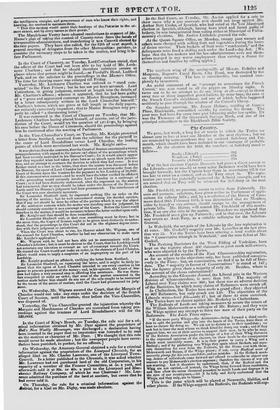In the Court of King's Bench, on Tuesday, the rule
nisi for a cri- minal information obtained by Mr. Dyer against the proprietors of Bell's New Weekly Messenger, was discharged ; a declaration having been inserted in the paper that no imputation was intended to be cast on the motives or character of Mr. Dyer. [We thought that this rule would never be made absolute ; but the newspaper people have never- theless been punished, in pocket, for no offence.] On Wednesday, the Attorney. General obtained a rule for a criminal information against the proprietors of the Liverpool Chronicle, for an alleged libel on Mr. Charles Laurence, one of the Liverpool Town- Council. In a letter published in the Chronicle, it was asked whether Mr. Lawrence had not purchased land of the old Corporation, in his capacity of a member of the Finance Committee, at 5s. a yard, and afterwards sold it at 30s. or 40s. a yard to the Liverpool and Man- chester Railway Company, of which he was Chairman ? Mr. Lau- rence admitted the purchase of the land at auction, but swore that he had never sold it.
On Thursday, the rule for a criminal information against the Ratirist, for a libel on Mr. Digby, was made absolute. Jo the Bail Court, on Tuesday, Mr. Austin applied for a rule to show cause why a quo warrant() writ should nut issue against Mr. Arthur Bott Cooke, of Ipswich, who had voted at thenate Municipal election at Ipswich, although, having been tried and found guilty of bribery, he was incapacitated from voting either at Municipal or Parlia- mentary elections. Mr. Justice Littledale granted the rule.
At the Queen Square Office, on Monday, twenty poor women and others were charged with selling fruit and vegetables during the hours of divine service. Their baskets of fruit were "confiscated," and the delinquents were fined a shilling each under the Lord's-day Act. [We hope that the law-makers and the law-adtninistrators were not them- selves engaged in any worse employment than earning a dinner for themselves and families by selling apples.]


























 Previous page
Previous page